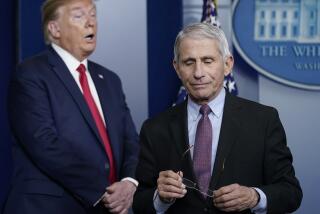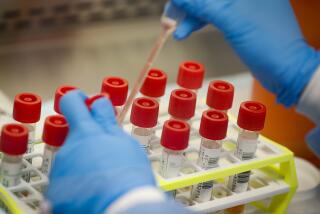Science Hasn’t Reduced Religiosity, Study Says
- Share via
Back in 1916, when a prominent researcher found that 60% of scientists didn’t believe in God, the results shocked the nation.
The findings by psychologist James Leuba were cited by conservative Christians and William Jennings Bryan--who later would gain fame as the prosecutor in the Scopes “Monkey Trial”--as proof that modernism was hell-bent on undermining public morality and leading college students to disbelief.
Indeed, Leuba predicted that disbelief would grow as scientific knowledge advanced. He went so far as to predict that Christianity would be forced to revise two cardinal beliefs: in a personal God and in immortality.
Now, eight decades later, two researchers have tested Leuba’s prediction that as knowledge increased belief would decrease.
Their findings: he was wrong. There is no greater--or lesser--belief among scientists today than there was in 1916.
“Leuba misjudged either the human mind or the ability of science to satisfy all human needs,” Edward J. Larson and Larry Witham wrote in the current issue of Nature, a leading peer-reviewed scientific journal.
Larson, the principal researcher and a professor of history and law at the University of Georgia in Athens, vouched for the validity of Leuba’s polling methodology in 1916, describing it as among the earliest efforts to apply the science of statistics to sociology. Leuba randomly sampled 1,000 scientists.
Using Leuba’s methodology, Larson and Witham found that, just as in 1916, about 60% of scientists do not believe in a personal God or an afterlife. Of the 60%, about 45% said they disbelieved in God, and about 15% said they doubted the existence of God.
That means that 40% of scientists believe in God--the same as 80 years ago.
“In the intervening years, religious belief has become more diverse. But to the extent that both surveys are accurate readings, traditional Western theism has not lost its place among U.S. scientists, despite their intellectual preoccupation with material reality,” the two wrote.
In an interview, Larson said he was surprised by the latest results. “The stereotype of scientists is that they tend to reserve judgment about things they don’t know about. It turns out not only in history but, about the same in our time, that scientists seem to know what they believe--or don’t believe. Either they’re a theist or a nontheist. There was not that great sea of doubt I would have expected.”
Of course, when it comes to belief in God, scientists are pikers compared to the U.S. population. The Gallup Poll, for example, has found that 90% of the general population believes in God, Larson noted.
A quote from one scientist spoke for the majority of his colleagues, Larson wrote. When asked if he desired immortality, the anonymous scientist replied, “It is pointless to desire the ridiculous.”
Leuba’s findings in 1916 set off a firestorm of reaction from Christians. Bryan, a Christian fundamentalist, Populist Democratic politician and attorney, repeatedly cited the poll as proof of eroding public morals and the dangers of modernism. It was Bryan who prosecuted Tennessee high school teacher John Scopes in 1925 for teaching Darwin’s theory of evolution, a violation of a Tennessee law that was not overturned by the state Legislature until 1967.
Larson, who earned his doctorate in the history of science and has a law degree from Harvard, is the author of books on science and religion. His latest, to be published next month, is “Summer for the Gods: The Scopes Trial and America’s Continuing Debate Over Science and Religion.”
(BEGIN TEXT OF INFOBOX / INFOGRAPHIC)
Scientists and God
Here are comparisons of beliefs expressed by scientists in 1916 and 1996:
*--*
1916 1996 Belief in a personal God Personal belief 42% 39% Personal disbelief 41 46 Doubt or agnosticism 17 15
*--*
*--*
Belief in immortality Personal belief 50 38 Personal disbelief 20* 47 Doubt or agnosticism 30* 15
*--*
*--*
Desire for immortality Intense 34 10 Moderate 39 26 Not at all 27 54
*--*
* Estimated
Source: Nature






